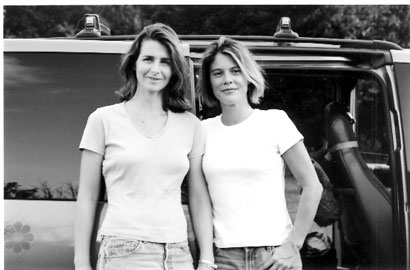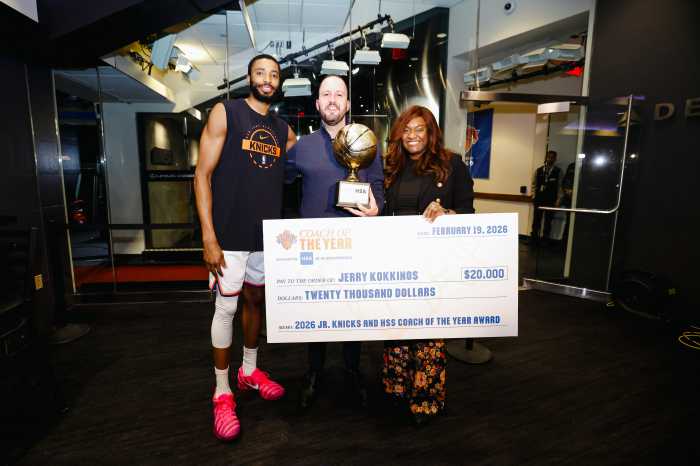By JERRY TALLMER
Modern-day, ‘perfect wife/mother/careerwoman’ debunked
Somehow, looking at these two slim, stunning women sitting there on a low concrete wall facing just outside the Cherry Lane Theatre, where they’d spent the afternoon interviewing possible actresses for “EVE-olution,” one couldn’t help thinking of two women out of a different play, Julia Hersey Gibbs and Myrtle Webb of Thornton Wilder’s “Our Town.”
Wives and mothers, that was the be-all-and-end-all for Julia Gibbs and Myrtle Webb. Julia Gibbs had one husband and two children, Myrtle Webb also had one husband and two children; the two ladies snapped beans together and talked of faraway places and antiques buyers and lived their lives — went right on living their lives — and that was it.
That was their careers, and nobody wanted it otherwise (except perhaps Simon Stimson, the church organist and choirmaster, and he was a drunk).
Jennifer Krier, co-creator of “EVE-olution,” is an author, a playwright, a cultural anthropologist emeritus, a wife, and at 40, the mother of three.
Hilary Illick, co-creator of “EVE-olution,” is a fiction writer, an essayist, a journalist emeritus, a playwright, a wife, and, likewise at 40, the mother of four.
These two latter-day bean-snappers met in, of all environments, a “Mommy and Me” kids’ gymnastics class in Cambridge, Massachusetts, three-and-a-half years ago. The encounter between the two Belmont, Mass., suburbanites sparked a shock of recognition — of self-recognition — in each of them.
Out of that moment has come the doubly autobiographical “EVE-olution” in which two young women named Liza and Alison (read Hilary and Jennifer) spill out unvarnished truths about career, marriage, childbirth, motherhood, boredom, tedium, sex, struggle, frustration, role problems, accomplishment, satisfaction, pride, joy — all of it, and a good bit more.
After readings and a triumphant week of performances by the two playwrights themselves in Cambridge a couple of years ago, the piece — then titled “Venus de Minivan” — arrives here, (renamed “EVE-olution), in early October at the Cherry Lane with real actresses Sabrina Le Beauf and Carolyn McCormick under the direction of Carolyn Cantor.
From 1995 to 1999, Bryn Mawr and Harvard graduate Jennifer Krier, who had done anthropological research in Sumatra, worked as an assistant professor of anthropology at Cornell, along with being a wife and mother.
Now, sitting on that low cement wall outside the Cherry Lane, she said: “When Hilary and I met that day at that gymnastics class, I’d left my job at Cornell and was experimenting with new creative-writing styles.”
“And I,” said Stanford graduate Hilary Illick, who had won prizes for short stories after working as a journalist in Paris and Boston, “was at that juncture looking for a collaborator — mostly because I was feeling kind of isolated as a mother and a writer. But I didn’t want a job.”
“And I also felt isolated,” said Ms. Krier. “I had left my job at Cornell so as to live in the same city as my husband” — Boston businessman Rob Cosinuke — “and because I’d found the job restrictive in terms of hours and creativity.”
“For the same reason that she quit her job,” said Ms. Illick, “I didn’t WANT a job. We also both wanted to get our voices out there, to debunk the cultural myth of motherhood: that you can have it all, with no cost, and be perfect.”
Krier: “When I went to Bryn Mawr there was no question but that we would all go on and have careers. Most of us went on to graduate school” — in her case, to Harvard for a Ph.D. “I didn’t realize until later that none of my professors in college had children …”
Illick (with surprise): “I never knew that about you!”
Krier: “I don’t think it sank in until I was a professor with children, and wondering why it was so untenable. Also, a lot of us had mothers who were dedicated to raising kids. My mother had wanted to do graduate work in history, and her professor at Wisconsin told her to forget about it.”
Illick: “My mother didn’t finish college, in order to have kids. She left Barnard to have me. Then, in the ‘70s, when I was 8 or 9, she went back and got her BA and MA at Bryn Mawr.”
Krier: “The point is, for me, I didn’t foresee the struggle, the conflicts between job and family. It didn’t occur to me, basically, until, at 30, I’d had my first child.”
Illick, whose husband is Pierre Valette, producer of TV’s “Arthur” show for children sadi, “I was 27.”
Krier: “I could talk about it in seminars or something, but I just thought it would be as easy for me as for my professors. It didn’t occur to me that the women who were teaching these seminars and writing these papers had basically given up” — were never going to have children.
Illick: “I was married and having babies while in graduate school at San Francisco State.”
Krier: “I think Hilary and I hit it off because we both realized the other was the kind of person who told juicy, truthful stories of what it is to be a mom, with all the mishaps and everyday conflicts — “
Illick: “ — and doubts.”
Krier: “To all accounts, we both looked to be highly competent mothers. It was nice to be able to talk about all the dark stuff, the hard part.”
They had started writing together almost immediately after they’d met, doing scenes, writing everything together.
“We talked it out and turned to the keyboard,” said Hilary Illick. “Extremely collaborative.”
The play doesn’t pull any punches, or seems not to, about some pretty rocky moments, bed-wise and otherwise, in each of their marriages.
Illick: “I’d like to say something. I don’t feel my marriage has ever been rocky. Even in this play. It’s one of the happiest marriages I know. I say this with full gratitude. We do pay homage to the husbands and all they have to do. We don’t think women are the only ones carrying a heavy load.”
Krier: “Even in healthy marriages you go to dark places, and you can emerge from them.”
Illick: “That’s the point. You can emerge within the same night. Or the same year. It depends.”
Krier: “What makes life so rocky is that there’s so much to negotiate. Everything’s up for negotiation.”
Had any of their children attended the readings or the performances in Cambridge?
Krier: “It’s not for children.”
Illick: “Not appropriate.”
Both together: “Please say it’s sold out!”
Illick: “And that we appeal to all generations and sexual orientations!”
Krier; “And the reason we’re down here looking for actors is so we can take our kids to school.”
Illick: “We didn’t want to be commuting mothers.”
Krier: “We didn’t in the beginning plan to write a play. We just wanted to do some cool, edgy mom thing — and it evoluted into a play.”
Illick: “We got swept up in something. You know how Michelangelo said that David came out of the stone — that David was already there in the stone?”
Jennifer Krier: “Right before we met we were like women at the end of our rope. We met, we talked, and this whole new thing turned around.”
Hilary Illick: “True creativity, true collaboration. One plus one equals more than two.”
It did for Julia Gibbs and Myrtle Webb also. Only there, Mr. Wilder spoke for them.





































